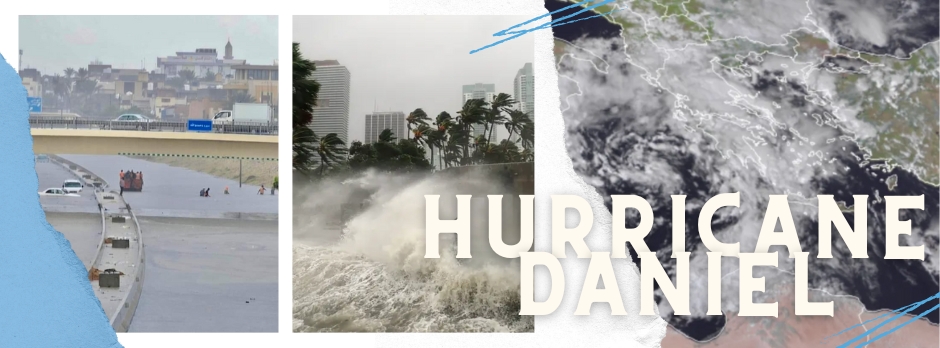Hurricane Daniel

Although hurricanes usually form in tropical regions, the number and strength of hurricanes in the Middle East have increased in recent years. This increase is believed to be due to the relative increase in temperature and humidity in the region.

On September 7, 2023, Hurricane Daniel struck Greece and Libya, causing significant damage in both countries. In Greece, the hurricane resulted in the death of 15 people and billions of dollars in property and infrastructure damage, prompting the evacuation of over 4250 people, specifically from areas near the city of Larissa and near the Pinios River.
In Libya, the hurricane forced thousands of people to evacuate their homes and caused extensive damage to agriculture, livestock, and widespread destruction of homes due to mudslides.
The cause of Hurricane Daniel is attributed to several factors, including:
- Global climate change, which increases the intensity and frequency of hurricanes.
- Rising temperatures lead to increased evaporation of water from the oceans, increasing moisture in the air and consequently increasing hurricane energy and strength.
- Human activity, including greenhouse gas emissions, also contributes to the worsening intensity of hurricanes.
None of the forecasters predicted that Hurricane Daniel would come with such intensity and strength as it did in Greece, but it happened and caused terrifying losses in Libya, confirming the scientific concept that high temperatures contribute to increasing hurricane strength by 30% and increasing the speed of hurricanes by 10%.
Therefore, Hurricane Daniel reflected the danger of climate change in the Middle East, showing how rising temperatures can increase the intensity and frequency of hurricanes.
The Middle East coasts have actually witnessed heavy rainstorms, but these storms were not as severe as those in the oceans due to the small water surface area in the Mediterranean Sea compared to the oceans, as well as the moderate temperatures in the Mediterranean Sea. However, recently, the temperature of the seas and oceans has increased, which will make this region threatened by new hurricanes.
It is expected that hurricanes will continue to increase in intensity and frequency in the future, which requires urgent measures to address climate change and reduce its impact on hurricane formation. Especially since the countries in the Middle East are not equipped to deal successfully with emergencies, either in terms of services or sustainable development.


